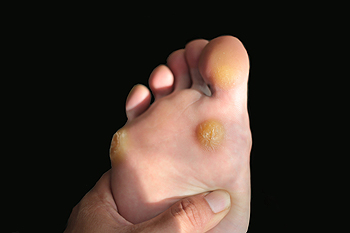 Warts are an abnormal skin growth that can be painful and unsightly. Plantar warts in particular may occur on the bottom of the foot and can be up to two inches wide. Warts form when a virus enters the skin typically through a cut or scrape, causing the skin to grow rapidly, resulting in a wart. Proper hygiene is very important as warts can be contagious. Warts can be contracted from sharing personal items such as towels and razors, or from public places like pools and showers. They can also be transferred to another part of the body after touching them. Warts can be treated by practicing proper hygiene, covering the wart to prevent spreading, and avoiding contact with the wart. However, it is best to consult with a podiatrist to prevent the wart from spreading or becoming worse.
Warts are an abnormal skin growth that can be painful and unsightly. Plantar warts in particular may occur on the bottom of the foot and can be up to two inches wide. Warts form when a virus enters the skin typically through a cut or scrape, causing the skin to grow rapidly, resulting in a wart. Proper hygiene is very important as warts can be contagious. Warts can be contracted from sharing personal items such as towels and razors, or from public places like pools and showers. They can also be transferred to another part of the body after touching them. Warts can be treated by practicing proper hygiene, covering the wart to prevent spreading, and avoiding contact with the wart. However, it is best to consult with a podiatrist to prevent the wart from spreading or becoming worse.
Plantar warts can be very uncomfortable. If you need your feet checked, contact Dr. James D. McAlexander from Gig Harbor Foot and Ankle Clinic. Our doctor will assist you with all of your foot and ankle needs.
About Plantar Warts
Plantar warts are the result of HPV, or human papillomavirus, getting into open wounds on the feet. They are mostly found on the heels or balls of the feet.
While plantar warts are generally harmless, those experiencing excessive pain or those suffering from diabetes or a compromised immune system require immediate medical care. Plantar warts are easily diagnosed, usually through scraping off a bit of rough skin or by getting a biopsy.
Symptoms
- Lesions on the bottom of your feet, usually rough and grainy
- Hard or thick callused spots
- Wart seeds, which are small clotted blood vessels that look like little black spots
- Pain, discomfort, or tenderness of your feet when walking or standing
Treatment
- Freezing
- Electric tool removal
- Laser Treatment
- Topical Creams (prescription only)
- Over-the-counter medications
To help prevent developing plantar warts, avoid walking barefoot over abrasive surfaces that can cause cuts or wounds for HPV to get into. Avoiding direct contact with other warts, as well as not picking or rubbing existing warts, can help prevent the further spread of plantar warts. However, if you think you have developed plantar warts, speak to your podiatrist. He or she can diagnose the warts on your feet and recommend the appropriate treatment options.
If you have any questions please feel free to contact our office located in Gig Harbor, WA . We offer the newest diagnostic and treatment technologies for all your foot and ankle needs.
